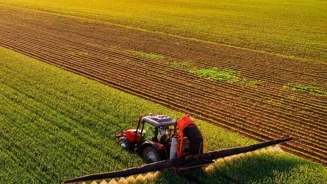Biotechnology revolutionizes Indian agriculture, offering sustainable solutions and boosting productivity. Dive into how this technology shapes the future
India, a land where agriculture forms the backbone
of the economy and sustains millions, is witnessing a silent yet profound revolution. This transformation is being fuelled by biotechnology, a field that harnesses the power of biology to create innovative solutions.
From enhancing crop yields to making plants more resilient to pests and diseases, biotechnology is offering a promising path towards a more sustainable and productive agricultural future for India. Let's delve deeper into how this technology is reshaping the Indian agricultural landscape.
Biotechnology's impact on agriculture: GM crops offer benefits but raise concerns in India
One of the most significant contributions of biotechnology to agriculture is the development of genetically modified (GM) crops. These crops are engineered to possess specific traits that offer advantages over their conventional counterparts.
For instance, Bt cotton, a genetically modified variety of cotton, contains a gene from the bacterium Bacillus thuringiensis (Bt). This gene produces a protein that is toxic to certain insect pests, effectively making the cotton plant resistant to these pests.
This reduces the need for chemical pesticides, benefiting the environment and lowering costs for farmers. Similarly, herbicide-tolerant crops allow farmers to use specific herbicides to control weeds without harming the crop itself, leading to more efficient weed management.
These advancements have the potential to improve crop yields, reduce input costs, and minimize the environmental impact of agriculture.
However, the adoption of GM crops in India has been a subject of debate, with concerns raised about their potential impact on biodiversity, human health, and farmer livelihoods.
A balanced approach, focusing on rigorous scientific evaluation and transparent regulatory processes, is crucial to ensure the responsible use of this technology.
Biotech advances in agriculture improve crops and disease detection for higher yields
Biotechnology extends far beyond just GM crops, with other technologies playing crucial roles in improving agricultural practices. Molecular diagnostics, for example, allows for the rapid and accurate detection of plant diseases.
This helps farmers identify problems early, enabling them to take timely action and prevent widespread crop losses. Marker-assisted selection (MAS) is another powerful tool that uses DNA markers to identify plants with desirable traits, such as disease resistance or high yield.
This allows breeders to select these plants for further breeding, accelerating the development of improved crop varieties.
Tissue culture, a technique involving the cultivation of plant cells or tissues in a controlled environment, is used for the rapid propagation of disease-free planting material.
This is particularly useful for crops like bananas and sugarcane, where traditional propagation methods are slow and often result in the transmission of diseases.
These biotechnological tools are revolutionizing plant breeding and crop management, enabling farmers to produce more food with fewer resources.
Biotechnology transforms animal husbandry and aquaculture
The impact of biotechnology is not limited to crop production; it is also transforming animal husbandry and aquaculture. In animal husbandry, biotechnology is being used to improve animal breeds through techniques like artificial insemination and embryo transfer.
These techniques allow farmers to select animals with desirable traits, such as high milk production or disease resistance, and breed them more efficiently.
Biotechnology is also playing a vital role in the development of vaccines and diagnostic tools for animal diseases, improving animal health and reducing economic losses. In aquaculture, biotechnology is being used to develop fast-growing and disease-resistant fish varieties.
This helps to increase fish production and meet the growing demand for seafood. Furthermore, biotechnology is being used to develop sustainable aquaculture practices that minimize the environmental impact of fish farming.
These advancements are contributing to a more efficient and sustainable livestock and fisheries sector.
Biotechnology aids soil health with biofertilizers and biopesticides, promoting sustainable agriculture
Biotechnology offers a range of solutions for addressing challenges related to soil health and nutrient management. Biofertilizers, containing beneficial microorganisms, can enhance nutrient availability in the soil and reduce the need for chemical fertilizers.

These microorganisms can fix atmospheric nitrogen, solubilize phosphorus, or produce plant growth-promoting substances. Biopesticides, derived from natural sources, offer an environmentally friendly alternative to chemical pesticides.
They are often more specific in their action, targeting only the pests and leaving beneficial insects unharmed. Furthermore, biotechnology is being used to develop plants that are more efficient at utilizing nutrients, reducing the amount of fertilizer required.
Phytoremediation, the use of plants to remove pollutants from the soil, is another promising application of biotechnology for improving soil health. These technologies are helping to create more sustainable and environmentally friendly agricultural practices.
Biotechnology in Indian agriculture needs awareness, regulation, research, and capacity building
Despite the immense potential of biotechnology, its successful implementation in Indian agriculture requires addressing several key challenges. Public awareness and acceptance are crucial for the widespread adoption of biotechnology products.
Many people have misconceptions about biotechnology, fueled by misinformation and a lack of understanding. Educating the public about the benefits and risks of biotechnology, based on scientific evidence, is essential to building trust and acceptance.
Strong regulatory frameworks are needed to ensure the safe and responsible use of biotechnology. These frameworks should be transparent, science-based, and regularly updated to reflect the latest scientific advancements.
Investment in research and development is vital for developing innovative biotechnological solutions tailored to the specific needs of Indian agriculture. This includes funding for basic research, applied research, and technology transfer.
Finally, capacity building is essential to equip farmers, researchers, and policymakers with the knowledge and skills needed to harness the potential of biotechnology.
The Indian government is actively promoting the use of biotechnology in agriculture through various initiatives and programs to the farmers.
Biotechnology revolutionizes Indian agriculture for sustainable future
The road ahead for biotechnology in Indian agriculture is full of promise. As we face the challenges of climate change, increasing population, and dwindling natural resources, biotechnology offers a powerful set of tools for creating a more sustainable and food-secure future.
By embracing innovation, fostering collaboration, and prioritizing responsible development, India can harness the transformative potential of biotechnology to revolutionize its agricultural sector and ensure food security for all its citizens.
This includes promoting the use of advanced technologies with cautious assessment and to take the agriculture sector to the new heights. These agricultural methods also enables farmers to increase their income and provide better life for their family and children.
AI Generated Content. Glance/InMobi shall have no liability for the content
















